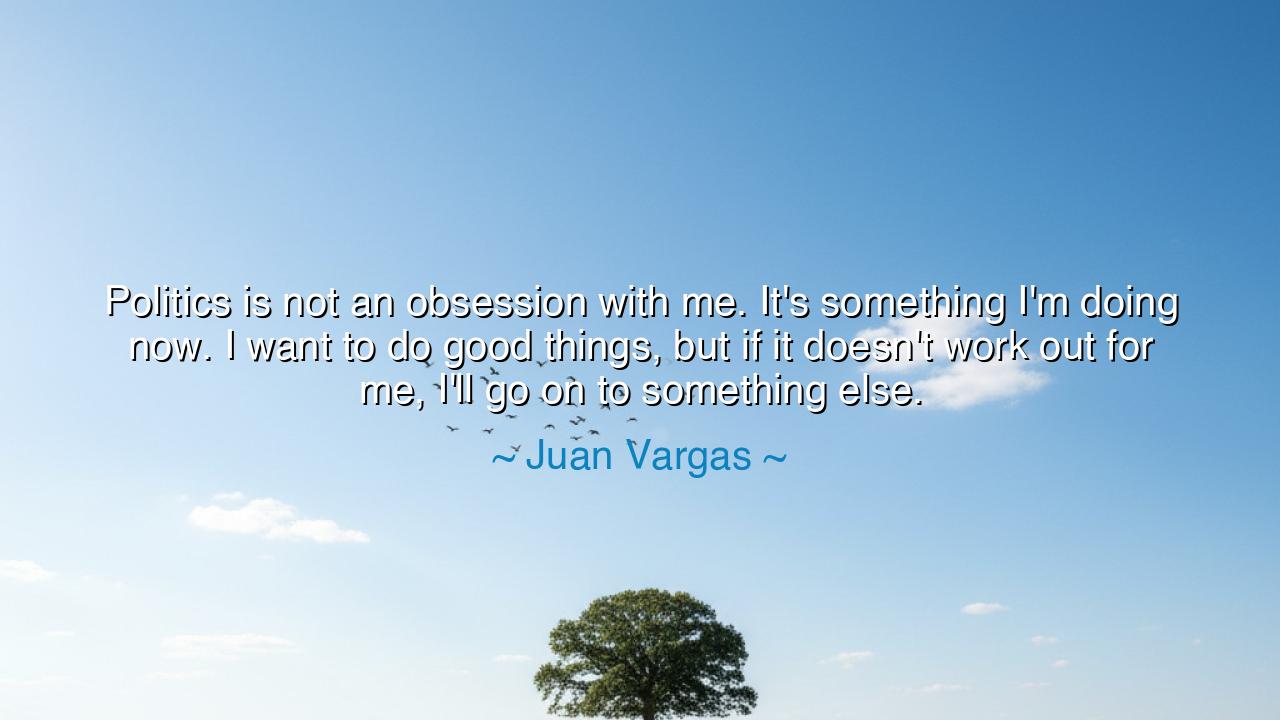
Politics is not an obsession with me. It's something I'm doing
Politics is not an obsession with me. It's something I'm doing now. I want to do good things, but if it doesn't work out for me, I'll go on to something else.






O children of the earth, hear the voice of Juan Vargas, who speaks with the wisdom of those who understand the fleeting nature of ambition and the true calling of the soul. He declares, "Politics is not an obsession with me. It's something I'm doing now. I want to do good things, but if it doesn't work out for me, I'll go on to something else." These words are not a denial of purpose, but a clear-eyed reflection on the nature of service, of duty, and of humility in the face of life’s ever-changing course.
In a world where politics is often treated as a sacred pursuit, a calling above all others, Vargas reminds us that it is but a chapter in the greater book of life. To be consumed by politics is to risk losing sight of the larger purpose—to serve the people, to do good, to leave a mark. But Vargas reveals that true wisdom lies not in the obsession with one path, but in the freedom to recognize that life offers many roads. If the road of politics does not lead to the desired destination, there are always other paths, for the soul’s journey is never bound to a single pursuit.
This truth echoes through the lives of those who have known the transitory nature of power and fame. Consider the life of Abraham Lincoln, whose time in politics was not marked by obsession, but by a quiet dedication to service. He did not seek the Presidency as a lifelong goal, but as a means to preserve the Union and to end the blight of slavery. Though he faced failure and setbacks, Lincoln never clung to the title for its own sake. His true calling was never to be a politician, but to serve humanity in the ways that called to him, even at great personal cost.
Vargas’s words remind us that success in politics—or in any other realm—is not the ultimate measure of a life well lived. The obsession with one goal can lead to blindness, where we miss the true opportunities to grow, to learn, and to serve in different ways. True greatness, O children of the future, lies in the freedom to adapt, to change course when the winds of fate blow in new directions. The one who clings to power or fame is like the traveler who refuses to take a different road, even when the path ahead is blocked.
So, let it be known that in the face of uncertainty, we must seek not to become slaves to our ambitions, but to remain faithful to the higher calling that guides us—whether in politics, art, or the simple acts of kindness we offer to one another. Like Vargas, we must embrace the wisdom of the present moment, of doing good while we can, but with the humility to recognize that if one road does not lead us forward, there are others waiting to be discovered. Let the journey be our reward, and let the service to others be the light that guides us along the way.






KTKim Tuyen
I really like this perspective—it’s not about being obsessed with politics, but about doing meaningful work while it’s relevant. However, I’m curious: is there a risk that this mindset might lead to politicians giving up too easily when things get tough? Wouldn’t we want someone who is in it for the long haul, even if the challenges are overwhelming? How do we gauge when a politician should push through versus when they should move on?
TLNguyen Tung Lam
I admire Vargas' approach of focusing on doing good work in the moment and being flexible about the future, but isn’t there a danger in not being fully committed to the cause? If politicians don’t have that sense of urgency and dedication, does that risk undermining their influence? How important is it for politicians to see their careers through for the greater good, even when the results aren’t immediate or certain?
KLHoang Khanh Ly
Juan Vargas seems to offer a refreshing, non-obsessive view of politics. He’s willing to move on if it doesn’t work out. But does this imply that he’s not deeply committed to the political process? Is it possible to do good work in politics while also being prepared to pivot when things aren’t working? How can we find a balance between dedication and flexibility in a system that often requires long-term effort?
HCHang CN
This quote resonates with me because it speaks to a level of detachment from the idea of power. It’s not about holding onto political positions for the sake of prestige but doing something worthwhile. However, I also wonder: isn’t that attitude risky? Politics is a long, unpredictable road—how do we know when to stick with it or let go? Can the willingness to walk away sometimes be a strength or is it a sign of lacking commitment?
DGDo Gam
I respect the humility in this quote, but it also makes me think: can we afford to have politicians who are willing to walk away from their positions if they don’t achieve immediate success? Politics often requires long-term dedication and perseverance, even when the results aren’t instant. Is there a risk that this mindset might hinder someone’s ability to see through long-term change and stick with tough issues?